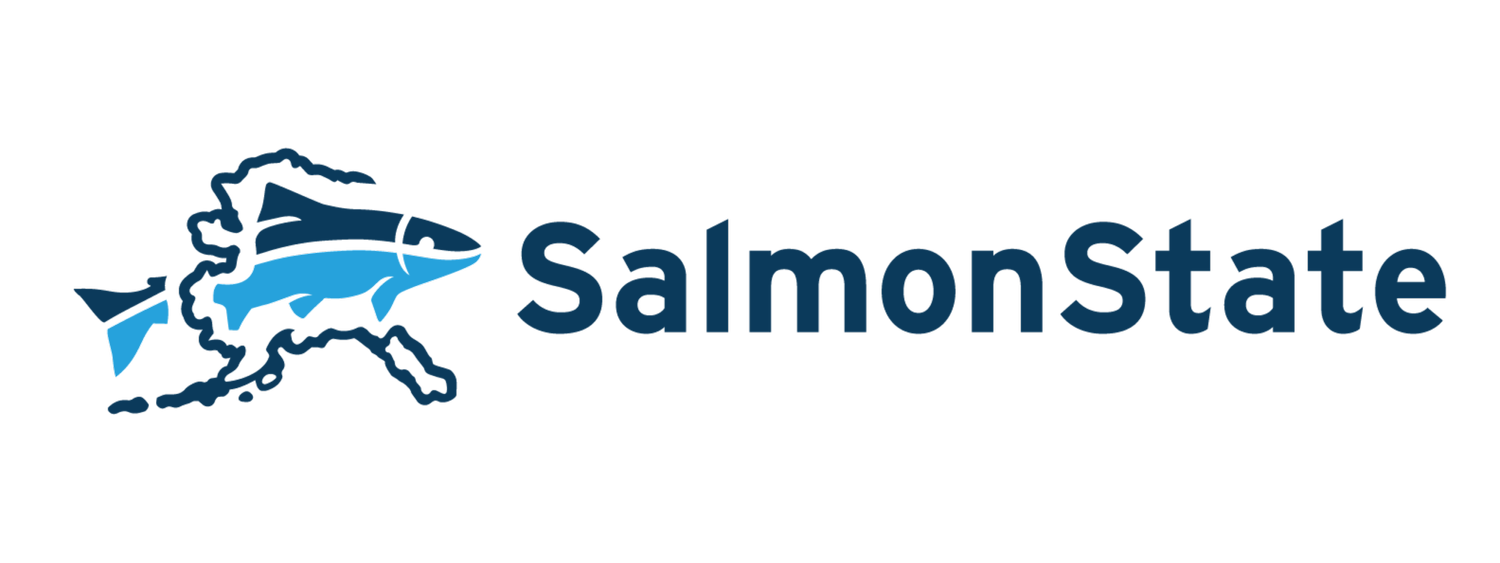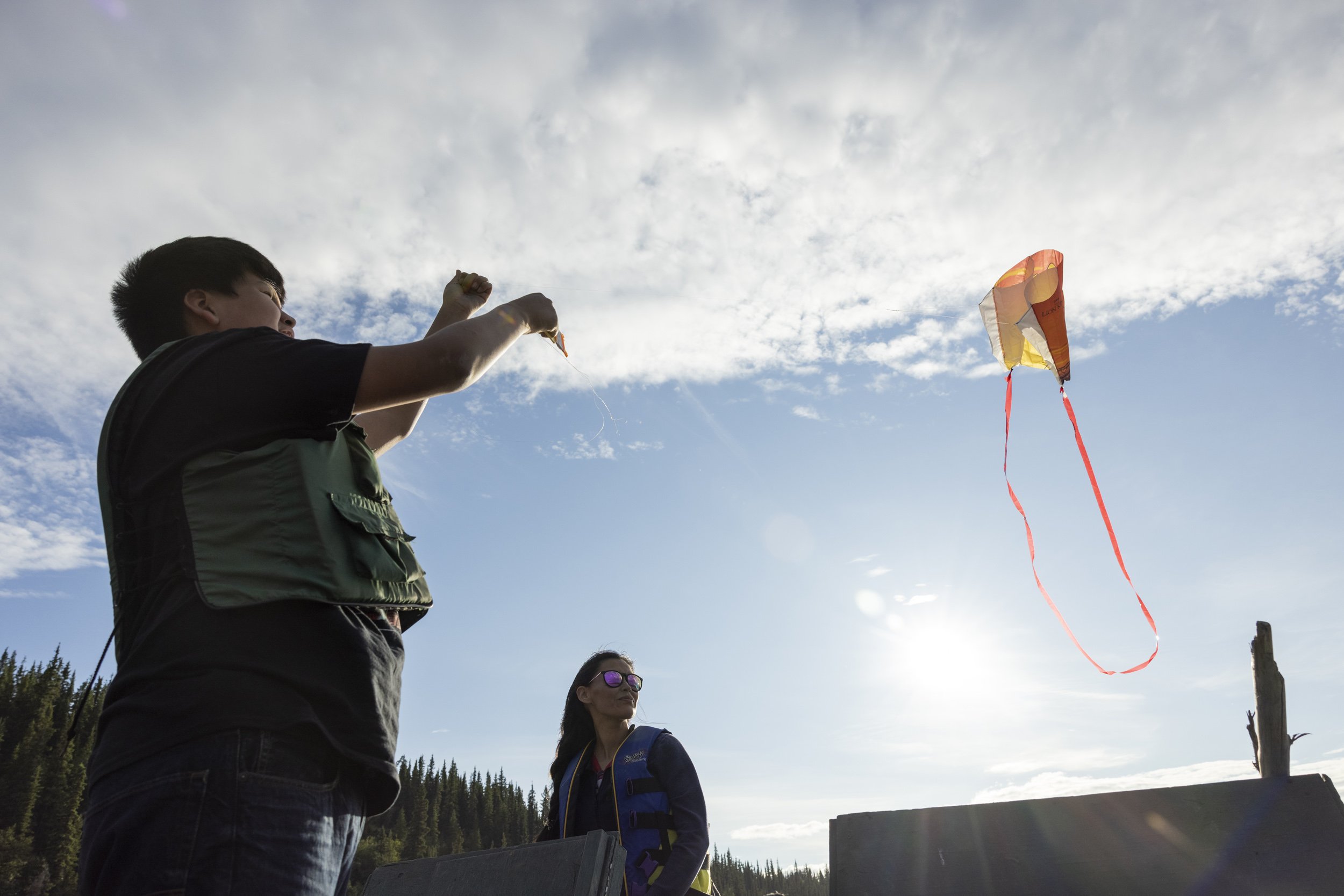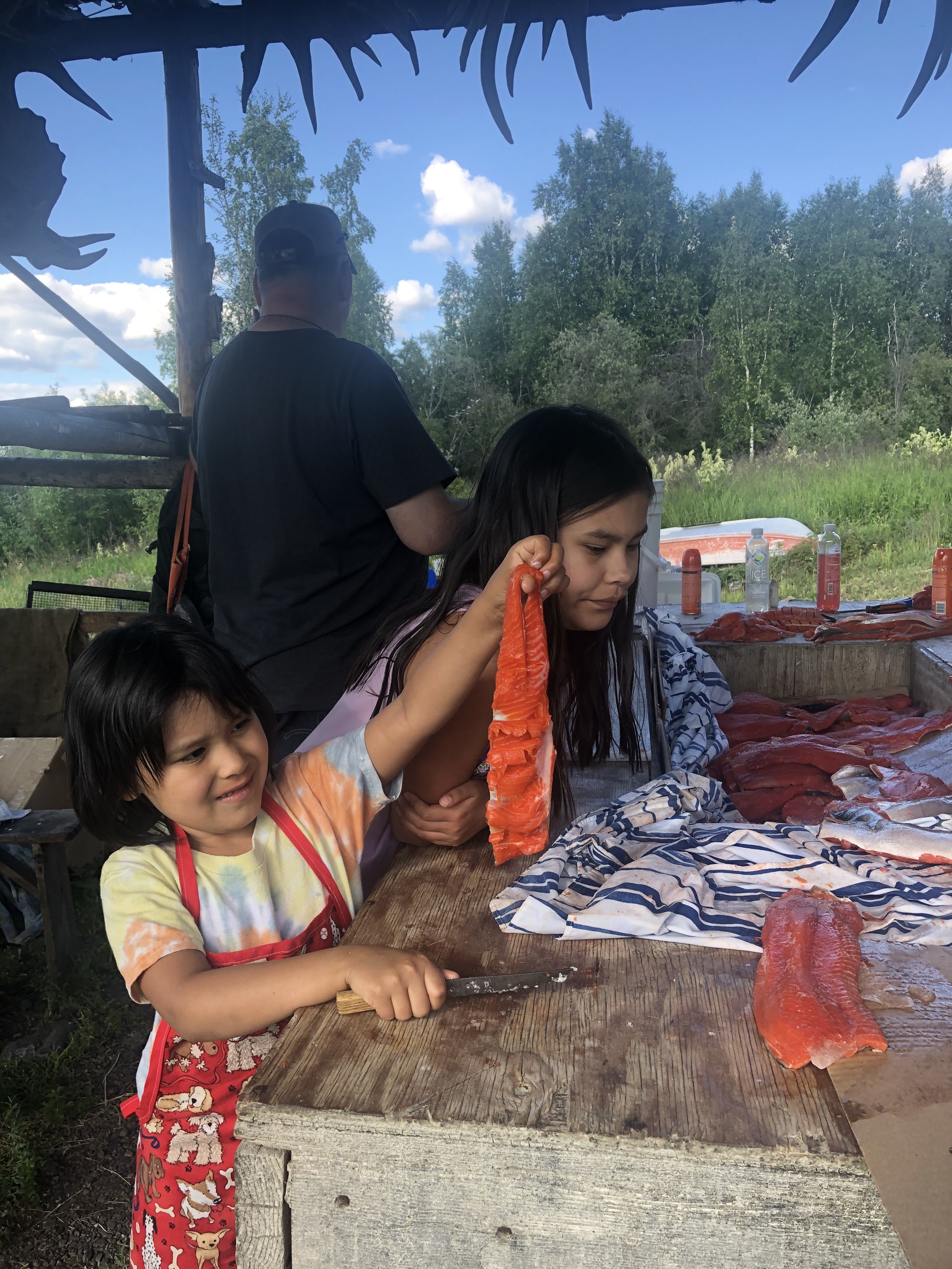Brooke Woods
“My parents raised their six children at fish camp right above our village of Rampart, on the Yukon River. I have very fond memories of being at camp. Multi-generation family members together harvesting salmon. Family members coming from different villages and cities to come and fish together.
For me that was a sense of peace and community, kinship and well being. Everything was fine and well when we were processing fish together.”
—Brooke Woods, Rampart resident, Yukon River, former Yukon River Intertribal Fish Commission Chair, climate adaptation specialist
“I always admired how well my parents worked together. They didn’t ask their kids for too much help. More so — take care of each other, take care of the home, make sure everyone is fed as they processed fish and filled the smokehouse for our winter supply of salmon strips, eating fish, and half dry. We would take care of our chores and then be able to swim all day while my parents put away dried fish, whole fish. That sustenance was so important to our family. We would have fish strips in the morning, salmon filets for dinner — and throughout summer, with both sides of the family, it was like we would eat fish for breakfast, lunch and dinner. Boiled, baked, fried. I think I took it for granted most of my childhood. And as I grew older, I learned how to set a net, check, gut, and make strips from my mom, ex-partner and his mother.
One thing that really pushes my advocacy right now is my kids. It makes me so happy to see them with their grandma on their dad’s side. She needs them to help. It’s awesome to see my son and his sisters helping to set the net, check the net, and then from there you’re gutting and fileting, cutting.
That’s been a pivotal point for me — to ensure that we have salmon for them. The work is not for me. It’s for my kids.”
—Brooke Woods, Rampart resident, Yukon River, former Yukon River Intertribal Fish Commission Chair, climate adaptation specialist
“When our salmon runs were well we had ample opportunity with abundance. I didn’t know who Fish and Game was, or State Troopers. But as I got older, by the time I was 19, we had our first salmon decline. And I remember thinking ‘Oh my gosh, I must live in a bubble.’ Because we weren’t fishing. There were no fish.
It dawned on me that there was somebody somewhere else making the decisions for our communities. It’s a feeling I can't describe, not being able to fish. I remember just going down to the river and touching the water. Having memories of being so busy with my family fishing — to a complete closure.
I had the opportunity to take one university class at the University of Alaska Fairbanks, and got introduced to the Tribal Governance program. That just ignited this spark, this interest in the histories you don’t learn in high school, in junior high. And it was almost a grief and healing process for me, just where I was in life and learning the Alaska Native and Indigenous histories. And not realizing how inequitable many systems are for Indigenous people, Alaska Native people, from the boarding school assimilation and then this very complex dual management system that doesn’t recognize aboriginal hunting and fishing rights.
Right there, I told my classmates and my professor, ‘I’m going to take one for the team and get a fisheries science degree.’”
—Brooke Woods, Rampart resident, Yukon River, former Yukon River Intertribal Fish Commission Chair, climate adaptation specialist
“I slowly got involved with the Yukon River Intertribal Fish Commission, being an advocate, finding my voice. I came from a very small village, being a quiet person, not seeking attention or having previous leadership roles, or public speaking opportunities, it was intimidating. But I had a lot of support from the other commissioners, friends, and family.
Shortly after becoming the commissioner for Rampart, the 30 member Tribes did appoint me to become the chair of the Fish Commission, early in my educational and career pursuit. I held that position for six years, really caring about uplifting Tribal governance, sovereignty, Tribes, and our right to hunt and fish. But if you’re a good leader, you support others to also become leaders. I stepped down from the chair position. There’s an amazing newly elected chair I work closely with and support.
And now I’m just one or two semesters from my degree. I was going to school part time, working full time, and raising my kiddos. I have one older college graduate, one in college, and 3 younger ones in high school, junior high, and elementary. I work towards a fair balance, prioritizing my kids and their education, not falling behind in classes, and doing good work for my employer. I work for Woodwell Climate Research Center and love the work and team. I’m a part of the Permafrost Pathways project, which is a six-year project… My role is policy around permafrost emissions, adaptation, and impacts to the environment, looking at the human dimensions, the cultural dimensions, and loss of both land and our animals and fish.
These are issues that were not created by Tribes, but they’re the ones at the forefront of it.”
—Brooke Woods, Rampart resident, Yukon River, former Yukon River Intertribal Fish Commission Chair, climate adaptation specialist
“I really love the work. But it’s hard protecting subsistence, or traditional ways of life. I almost explain it as traversing a mountain but also going backwards to put out wildfires.
The fisheries system itself is very inequitable. We don’t have a fair representation of Alaska Native people or subsistence on the Board of Fish. There is no Alaska Native or subsistence representation on the North Pacific Fishery Management Council (which governs trawlers and their bycatch.) And these are the bodies that are making the decisions that impact Tribes, and the salmon runs.
It’s also a capitalist issue. Pollock is a billion dollar industry. For voting members of bodies to make a decision against pollock — what does that mean? The council is dominated by the pollock representatives, both the council and the AP (Advisory Panel.)
It's this game. The decisions are already made. We’ve seen this growth of advocates, and hundreds of testimony and written comments, and Tribal citizens showing up — with no action. And to ask Tribes to continue to do that without the proper representation or even a sound, fair decision… We need at least two Alaska Native positions on the North Pacific Fishery Management Council. I’m on the Yukon River panel as an advisor. And there are strong representatives from the Yukon River on that board. What would it take for the Fish & Game commissioner to identify and appoint one of those people?”
—Brooke Woods, Rampart resident, Yukon River dweller, former Yukon River Intertribal Fish Commission chair, climate researcher
“Salmon declines — it’s more than just being able to fill your freezer and go out on the river. It’s community, it’s well being, it’s your mental and physical health when you’re active for 14-18 hours per day with your family on the water and at the smokehouse taking care of your day’s catch.
We live in one of the harshest climates in the world, but salmon kept our bodies and our minds well. Vitamins we lack, like Vitamin D, salmon helped our people be well, survive, and be resilient.
One of the voting members for AP (Advisory Panel to the North Pacific Fishery Management Council, which makes decisions governing trawl bycatch ) says she feeds hungry American children with her school lunch pollock product.
School lunch program is a lucrative federal funding opportunity for the pollock industry, it’s not like it’s charity or goodwill. And my kids have never come home and said ‘Oh I love this fish I ate today.’ Those are not valid decisions or thought processes when Alaska Natives — Alaskans — are not being able to feed their families.”
—Brooke Woods, Rampart resident, Yukon River dweller, former Yukon River Intertribal Fish Commission chair, climate researcher
“Our kids have to grow up with their Native foods to be able to process it and value it. The king salmon, it’s very rich. They have to have that in their diet at an early age to be able to handle the high oil content. And the same for seal oil. My kids are Inupiaq on their dad’s side. I introduced them to seal oil at a very young age because some foods are an acquired taste. If they have their traditional food at an early age, they adapt to the richness, the flavors, and it’s just a part of who they are.
If our kids are not growing up with this fish, how are they going to know the importance of it? And how do they become the next generation of advocates if they’re like our family, where they have to leave the village for education and job opportunities?
There’s a lot at stake. No salmon, and it’s our fourth year we haven’t been able to fish. That’s a crisis. It’s a cultural crisis, it’s a food security, a food sovereignty crisis. It’s a well being crisis.
So many of our loved ones are passing before they even have the opportunity to fish again, to have fresh king salmon. To have someone share king salmon strips with them. And that just breaks me.”
—Brooke Woods, Rampart resident, Yukon River dweller, former Yukon River Intertribal Fish Commission chair, climate researcher
“I’ve seen Elder interviews from the seventies, the eighties. They express the same concerns, with no action taken, for both Area M and for trawl bycatch. Elders back in the day called it high sea fishing. And it’s very true. And I just feel like so many times, decision-makers, scientists, researchers — they want to discredit that concern. They say ‘It’s only 10 percent, it’s only 5 percent, it’s only 500,000, and only so much was bound for Western Alaska’ — but we don’t have the ability to say that inriver. Inriver the only people that are being held responsible, that aren’t responsible, are the Tribes. We are completely shut down from all salmon fishing. Whitefish — I don’t take it for granted, I appreciate it, but it’s not meant to sustain my family for the winter. I would need a lot of whitefish to be able to feed my family.”
—Brooke Woods, Rampart resident, Yukon River dweller, former Yukon River Intertribal Fish Commission chair, climate researcher
“We got a few bycatch salmon in our whitefish net. There was one fall chum, and he was alive. And just doing this work, I know every fish counts. I told the fish that if he stopped moving I would let him go. And I tried not to touch him, because elders say if you touch them, it disorients them, it causes stress. And I have seen that, letting one fish go, and it swims downriver.
I let that chum go, because I know how important it is for it to be able to spawn. In federal and state-managed fisheries chum are caught and discarded and intercepted to be sold. Whereas inriver, Alaska Native people are told no salmon fishing for any species. And the federal and state fisheries remain completely open outside of the river systems that impact AYK salmon stocks.
I am personally not trying to shut down the pollock fishery, or Area M. But it is a call to action. It is a request from your neighbor. They act like it’s the end of the world shutting down the pollock industry but its acceptable for Alaska Natives to forego fishing for 4 years.”
—Brooke Woods, Rampart resident, Yukon River dweller, former Yukon River Intertribal Fish Commission chair, climate researcher
“The people making these decisions — they don’t reside in the AYK region. They live in cities, and they probably have nice lives, they work 8-5, and head home without the worry of no salmon harvest or dry fish. They make a decision. They shut down a Tribe, they shut down a fishery in AYK. It doesn’t impact them as deeply as it does families on the river.
It’s so gosh darn expensive to fly yourself out, let alone your entire family. And the cost per pound is insane. To preserve your foods, oftentimes you have to freeze your proteins, so that adds cost to fly much needed protein and commercial goods to a remote village. You also have to think about the extreme cost of commercial foods, both in the local community and urban areas.
On the Yukon River panel, during public testimony, one lower river fisherperson said that in her village there are families rationing food because of the salmon declines. There’s a family that’s rationing food, and they only eat once a day. And that’s real.”
—Brooke Woods, Rampart resident, Yukon River dweller, former Yukon River Intertribal Fish Commission chair, climate researcher
“When I was at the Yukon River Intertribal Fish Commission working with the AYK Tribal Consortium, which represents 118 Tribes, I feel like we exhausted every single avenue, every request we could possibly make. They were all denied.
We had Tribal consultation with the National Marine Fisheries Service, with NOAA, with the Department of Interior. We worked year round with the North Pacific Fishery Management Council. And no action.
We need action now, especially if you’re asking Tribes not to fish for three or four years. We also need action from other fisheries that are responsible for the harvest of declining salmon species. And it is a crisis.
Right now we have 600 summer chum when we should have 45,000. Chum are intercepted in the Area M fishery. There is no chum cap in the pollock fishery. And king salmon — at halfway through June, there were 1,700, 1,900, when there should be 10,000 to 12,000 kings.
We are the stewards of these salmon. We’ve cared for them, they’ve been a part of our culture for over 10,000 years. When archaeologists dig up places where our people existed, they will find salmon in our DNA, and salmon in the camps. So it’s science-based knowledge as well as traditional knowledge that we have been here for over 10,000 years. And that stewardship hasn’t gone away. We live by traditional values as a community, as Tribes, as families. It’s time that Tribes have better decision-making in the state and federal management, and that Tribes’ requests are actually being met, not shut down.”
—Brooke Woods, Rampart resident, Yukon River dweller, former Yukon River Intertribal Fish Commission chair, climate researcher


























